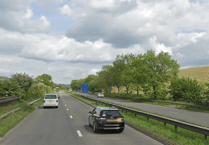Bristol Avon Rivers Trust (BART) recently spent time collecting water samples from rivers in the Bristol Avon area to assess water quality data across the catchment.
CEO of BART, Simon Hunter, said: “With growing public awareness of the critical importance of freshwater quality to human health, environmental sustainability, climate resilience, and economic prosperity, collective action to ensure clean and safe water for future generations is more crucial than ever.”
BART has been collecting water quality data for the past nine years through their volunteer-led ‘Bristol Avon RiverBlitz’ initiative, and now have results from this year’s survey.
This year’s RiverBlitz saw 133 volunteers collect 202 samples throughout the Bristol Avon catchment from July 5 to 14. Volunteers are given easy-to-use water quality testing kits and record their data on BART’s RiverBlitz website portal.
This year’s Blitz showed that 69% of samples had high nutrient loads, while just 3.5% recorded low nutrient levels at that given time. Phosphate levels were evenly distributed between high, medium, and low readings during the 2024 event. Nitrate concentrations were higher throughout the catchment compared to the previous event. Only 5% of the samples showed low nitrate levels.
Simon Hunter explains: “Nutrients, particularly phosphates and nitrates, are amongst the most common pollutants of freshwater across the world. These nutrients occur naturally in a healthy river environment but can enter watercourses in higher quantities due to pollutants such as fertilisers, sewage and products like washing detergents. High nutrient concentrations in rivers and streams can lead to excessive plant growth and harmful algal blooms which can suffocate other organisms.”
The data collected in July 2024 suggests that nutrient pollution is likely impacting water quality and the health of some watercourses and wildlife across the Bristol Avon. This year’s milder summer with frequent rain may have resulted in lower nutrient levels, particularly in smaller catchments, as moist soils better retain nitrogen and phosphorus.
Simon Hunter said: “There are several other parameters we did not test that could also impact river health, such as bacterial and chemical readings. Healthy rivers require good quality and well-connected habitats, and enough water year round.”
He continued: “We extend our heartfelt thanks to the Bristol Avon Catchment Partnership, Bristol Airport Community Fund, Schroder Charity Trust, Frognal Trust, Pilning & Severn Beach Parish Council, Avon Wildlife Trust, Wiltshire Wildlife Trust, Wiper & True, and The Big Give for their generous support of this year’s event.”
For more information about Bristol Avon Rivers Trust, visit https://bristolavonriverstrust.org/




.jpeg?width=209&height=140&crop=209:145,smart&quality=75)